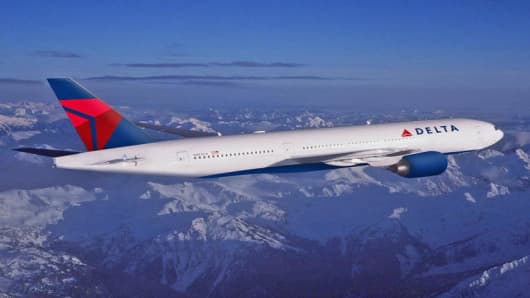Delta Air Lines is looking to cut 2,000 jobs, or more than 3 percent of its work force, as the No. 3 U.S. airline struggles with high fuel costs. And UAL, the parent of United Airlines, said it will tackle fuel costs by making cuts to its fleet of aircraft.
Shares of both Delta and UAL climbed higher Tuesday.Delta, which has been unable to seal a merger with rival Northwest Airlines page90nwafalsetrue43pricetruefalsefalsefalsefalse0QuotefalsetrueChartfalsetrueNewsfalsetrueProfilefalsetrueAdd to Watchlistfalsetruetruehttp://api-cdn.cnbc.com/api/chart/chart.aspGE4true3, will offer voluntary retirement and buyout packages to 30,000 employees.
Delta is looking to cut 1,300 rank and file jobs and 700 administrative and management jobs.
In a regulatory filing Tuesday, Delta also said it will cut flights in the United States, aiming to reduce 2008 domestic capacity by an additional 5 percent by August, resulting in a 10 percent year-over-year capacity reduction.
These reductions will be achieved partly by taking 15 to 20 mainline aircraft and 20 to 25 regional jets temporarily out of service.
United Shrinks Its Fleet
Meanwhile,UAL will shrink its fleet by up to 4 percent this year to combat the skyrocketing cost of jet fuel, the chief executive of the No. 2 U.S. carrier said on Tuesday.
In a message to employees, Glenn Tilton said the airline aims to eliminate 15 to 20 of its older, less fuel efficient narrow-body planes. United's fleet currently has 460 aircraft.
The airline industry has been battered by rising fuel costs, which are directly linked to the price of oil. A barrel of crude touched a record high on Monday of $111.80
"Continued uncertainty about the overall U.S. economy with the price of fuel at historically high levels has put significant pressure on all U.S. carriers," Tilton said.
United and other airlines have attempted to offset the fuel burden with fuel surcharges, fare hikes and charging for services that previously were including in the fare. But some experts say airlines may find it harder to pass the expense to travelers if a weaker economy erodes travel demand.
The fleet reduction is part of a broader effort to offset a possible $1 billion increase in fuel costs in 2008, UAL's Chief Financial Officer Jake Brace said in a statement earlier on Tuesday.
The airline currently has 20 percent of its anticipated 2008 fuel requirements hedged, Brace said. That's up from 16 percent as reported in previous regulatory filings.


